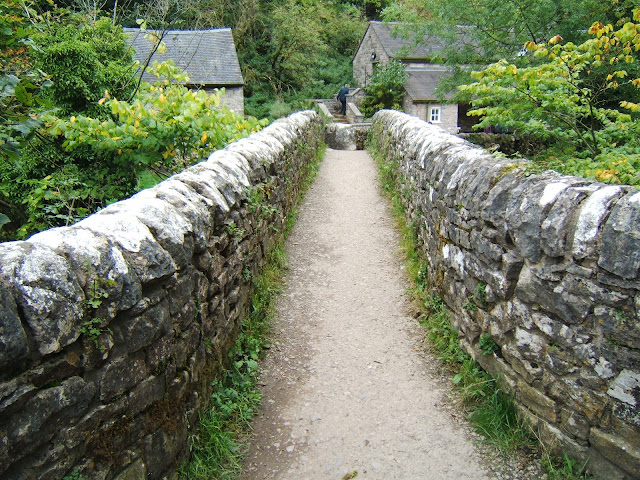This ancient packhorse bridge is a short stroll across a few fields (and a hairy slither down a steep bankside) from Alstonefield. It spans the River Dove at Milldale, a hamlet of stone cottages lying between Dovedale gorge to the south and Wolfscote dale to the north.
Once, Milldale was a busy industrial centre with a corn mill and ochre mill by the river, and Lode Mill, which prepared lead ore for smelting. Now it is visited mainly by walkers; lots and lots of walkers, who come to enjoy the natural beauty of the dales.
The bridge is generally known as Viator's Bridge; a viator being a traveller or wayfarer from the Latin viāre, to travel. It is thought to have gained this name when Izaak Walton, author of The Compleat Angler (1653) first saw the bridge and exclaimed "Why! A mouse can hardly go over it; 'tis not twelve fingers broad."
His reaction was prompted by the narrowness of the bridge, made particularly noticable by the lack of any kind of wall. In the days of the packhorse routes, bridges were built with low parapets in order for the paniers to cross without interference. The higher parapets were added to this bridge at a later date.
The addendum to the 1676 edition of The Compleat Angler introduced the reader to two characters, one of whom was based on Izaac Walton and called Viator. Hence the name by which the bridge came to be known.
I'm pleased to say that Viator Bridge is listed as an ancient monument.
I wonder what other students have chosen as their B project over at Jenny Matlock's..





Please write a book and put your words and pictures out there for other people to enjoy.
ReplyDeleteLove your ‘B’ post - such an exquisite bridge!
ReplyDeleteHappy Alphabe-Thursday,
LOLA:)
btw My quick Alphabe-Thursday link is here
Very pretty and a place to stand and dream for awhile!
ReplyDeleteWhat a perfect B word and very educational. Thanks for sharing your beautiful photos and story. Loved the history lesson.
ReplyDeleteThat bridge is very old .Pope Benedict XVI visited the UK a couple weeks ago and it was said he was a bridge builder between Anglicans and catholics and I noticed you're from the UK . Interesting.
ReplyDeleteI love old stone bridges. The work that went into them is mind boggling...
ReplyDeleteWhere I come from, there are a lot of stone walls and I always wondered about the men and women who labored to make them...
Thanks for an education about a different kind of stone structure..
This bridge looks so romantic to me !
ReplyDeleteI am participating for the first time in this meme.
I love these photos and the history of this beautiful inviting bridge.
ReplyDeleteThis was VERY interesting, and your photos are excellent. A rewarding B!
ReplyDeleteNow I am taking a hairy slither into the kitchen to cook dinner. Glad I stopped by--I learned a lot! hahaha!
Such a wonderful old bridge and I'm so glad the area is keeping it as history!
ReplyDeleteWanted to thank you for your visit to my blog today and your kind words.. I'm hanging in there for sure!!
Thanks again
Sandy
I love it! Your pictures are wonderful!
ReplyDeleteI love the thought of a 'hairy slither'!
ReplyDeleteThis bridge just captures the imagination. I'd love to walk on it and look over the sides, imagining life when the bridge was built.
I think this may be the perfect bridge! Do they call it the Platonic ideal (I may have got that entirely wrong mind)? Exactly what a bridge should be.
ReplyDeleteI'm not sure what I love more!
ReplyDeleteThis absolutely gorgeous bridge or this statement: and a hairy slither down a steep bankside!
What a wonderful link to Alphabe-Thursday!
I really, really enjoyed the history and my stop here today.
Thank you for linking.
A+
What a wonderful bridge! What a wonderful post!
ReplyDeleteYour photo's are wonderful. I'm glad they built the sides up as I wouldn't be able to walk across it otherwise. : )
ReplyDeleteDana
Neat B post....Thanks for sharing
ReplyDeleteThat is an awesome bridge! I've never seen anything like it.
ReplyDelete